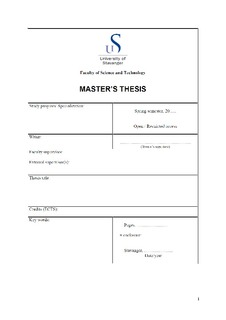| dc.contributor.advisor | Roll, Helen Kristin | |
| dc.contributor.author | Johansson, Louise | |
| dc.date.accessioned | 2016-10-03T08:49:26Z | |
| dc.date.available | 2016-10-03T08:49:26Z | |
| dc.date.issued | 2016-06-15 | |
| dc.identifier.uri | http://hdl.handle.net/11250/2412438 | |
| dc.description | Master's thesis in Industrial economics | nb_NO |
| dc.description.abstract | This thesis is a study on entrepreneurial financing and the support mechanisms that exist to help founders manage their entrepreneurial journey between the establishment phase and the growth phase. It is an analysis of different funding alternatives and challenges that occur when a start-up enter the growth phase. It is also a feasibility study of how Norway can improve as an entrepreneurial country and, more specifically, Stavanger as an entrepreneurial region.
Throughout a qualitative interview process, the assignment highlights how the start-up ecosystem in Stavanger support growth-oriented entrepreneurs related to the ongoing readjustment that will radically affect the labour market in the Stavanger region.
Moreover, the report analyses situations where many Norwegian entrepreneurs struggle to grow further. This period, often referred to as the “valley of death”, do often characterise situations when public development funds are used, and where start-ups involves too high risk in order to receive bank financing. Finding risk capital to finance growth in early growth stages is one of the biggest challenges that entrepreneurs face. An increased amount of private investments to finance early stage growth have proven to have a significant impact on economic growth in many countries.
The results from the interview process indicates that many entrepreneurs needs a better overview of different financial resources available in the early growth phase and that the private investor environment in Stavanger is not visible enough. The results are important for Stavanger in order to build a more progressive investment community with expertise within other fields than the oil and gas industry. Norway needs to continue improving the investment culture in level with Sweden, Finland and Denmark. These countries have succeeded to attract a much higher percent of venture capital investments and hence, developed more internationally successful ventures. There is a need for implementing tax-incentives that can motivate more local investors to invest in start-ups in early stages. An increased amount of governmental pre-seed funding will be one solution in order to co-finance and share technological risk with private investors, and at the same time motivate them to contribute to the readjustment process. | nb_NO |
| dc.language.iso | eng | nb_NO |
| dc.publisher | University of Stavanger, Norway | nb_NO |
| dc.relation.ispartofseries | Masteroppgave/UIS-TN-IØRP/2016; | |
| dc.rights | Navngivelse 3.0 Norge | * |
| dc.rights.uri | http://creativecommons.org/licenses/by/3.0/no/ | * |
| dc.subject | industriell økonomi | nb_NO |
| dc.subject | entrepreneurial funding | nb_NO |
| dc.subject | start-up ecosystem | nb_NO |
| dc.subject | growth-oriented entrepreneurship | nb_NO |
| dc.title | A study on how to improve the start-up ecosystem in Stavanger for growth-oriented entrepreneurs, in light of the ongoing readjustment process | nb_NO |
| dc.type | Master thesis | nb_NO |
| dc.subject.nsi | VDP::Social science: 200::Economics: 210 | nb_NO |

